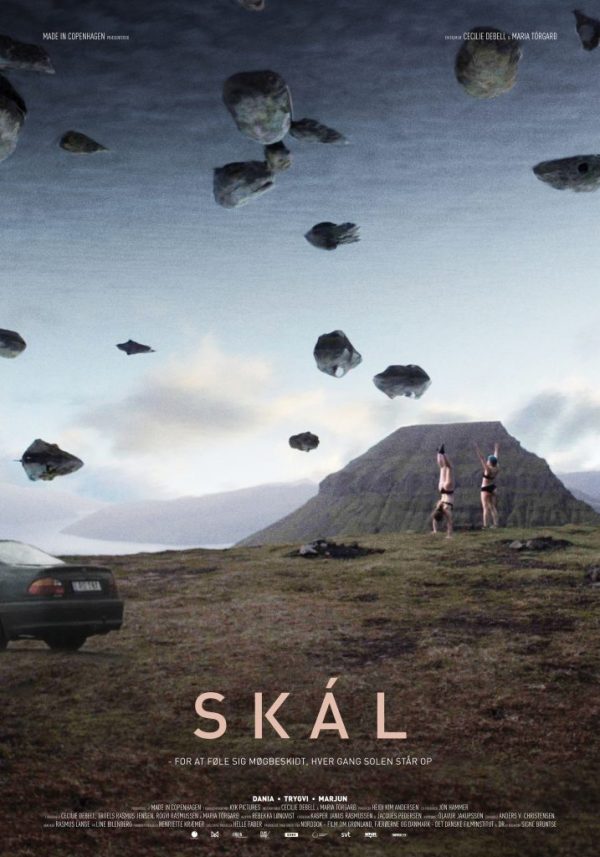
“Skál” (“Cheers”) (2021). Cast: Dania O. Tausen, Trygvi Danielsen, Marjun Drós Tausen Poulsen. Directors: Cecilie Debell and Maria Tórgarð. Web site. Trailer.
Where would we be without personal freedom? The prospect is rather daunting, especially once we consider what we’d lose. Its absence can prove particularly detrimental during certain times in our lives, such as adolescence and young adulthood, when we’re just beginning to grasp the possibilities that the world can offer us. And that can be made even worse if we’re shielded from being able to see those options in the first place. Such are the circumstances that an aspiring poet discovers for herself when she emerges from longstanding isolation in the thought-provoking new documentary, “Skál” (“Cheers”).
Leading a sheltered, isolated life can provide one with a significant degree of comfort, safety and certainty. Knowing how things are – and how they’re allegedly (and steadfastly) supposed to be – serves to remove much of the doubt, ambiguity and insecurity that those lacking such unshakable conviction often experience. Attaining such a state of being is comparatively easy, too, when one lives in a tight-knit conservative Christian community in which everyone looks after one another. And that’s particularly true in a sparsely populated remote location like the Faroe Islands, an autonomous North Atlantic enclave of the Danish Commonwealth located nearly equidistant between Scotland, Iceland and Norway.
Those multiple layers of seclusion have kept 21-year-old Dania O. Tausen confined to a fairly limited range of existence and experience. Frequent reinforcement of her community’s spiritual and ethical values, especially by her loving but less than open-minded parents, has led Dania to unquestioningly embrace notions like “Either you believe in Jesus or you believe in Satan. There’s no in between.” And, for most of her life, she’s willingly gone along with what she was taught. In fact, her devotion is so strong that she has often been prominently featured as a singer at the congregation’s services and special events, making her one of the community’s better-known members.
But is this truly enough? When we’re in our youth, we often go through a time of exploration and introspection, examining our world, our beliefs and what we want out of life. And, when we’re exposed to a wide range of options and ideas that come from outside the existence we’ve typically known, it can have a profound impact on us, leading us to a change of heart on many fronts. Indeed, the age-old adage “How are you going to keep them down on the farm once they’ve seen Paris?” frequently rings true. That’s certainly the case for Dania when she moves out of her family’s residence and takes a place with her friend Marjun in Tórshavn, the capital and largest city in the Faroes, a locale where she’s exposed to an array of secular influences far different from anything she’s ever known.
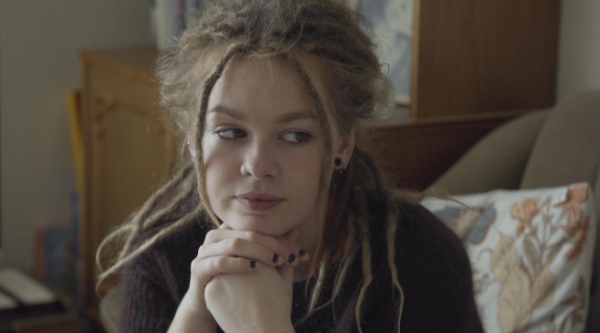
Dania’s schooling, for example, introduces her to a wide range of people and ideas not at all like anything from her upbringing. Socially she begins engaging in activities like going to clubs. And, romantically, she meets and begins dating a popular hip hop artist, Trygvi Danielsen, who performs under the name Silvurdrongur (Silver Kid) and composes songs containing in-your-face lyrics on subjects that Dania’s family and congregation are likely to find more than a little objectionable.
Needless to say, these changes in Dania’s behavior prompt her religious peers to question her faith. They wonder whether she has come under the influence of negative forces. Her parents in particular are especially worried. Has she been lost to them? Has she indeed fallen prey to the clutches of Satan?
These concerns are inflated further when Dania begins writing a collection of poems addressing issues like teenage rebellion, anxiety and freedom, all of which openly question the conventional values she was raised with. Her upbringing is thus placed under the microscope, and her poems develop quite a following among contemporaries when they’re published in a book titled Skál (Cheers), a work that becomes a local best seller and a staple in the Faroese educational system. In many ways, the poetry anthology is a testament to the feelings of a restless generation that hungers for greater degrees of expression in their art, their lives and their spirituality.
As Dania achieves this newfound notoriety, she explains herself to the skeptics, saying that she does not wish to abandon her faith or her community. Rather, she merely seeks to help it evolve, encouraging a greater degree of tolerance, freedom and a willingness to allow individuals (especially younger ones) wider latitude in being themselves. Dania, Trygvi and Marjun all want to be accepted for who they are, not who they’re expected to be, a birthright to which they believe everyone is entitled. Admittedly, this is a tough sell in this North Atlantic Bible Belt, where religion plays such an ingrained role in virtually every aspect of daily life and social interaction. But Dania believes that she needs to make a statement to enable the residents of this remote archipelago to feel less restricted in their outlooks, their behavior and even their physical appearances.
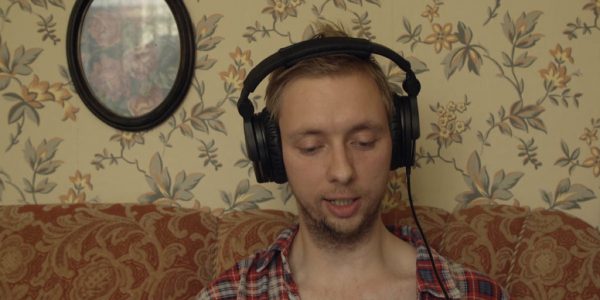
Can this goal be accomplished, or will residents of the Faroes be forced to continue living double lives as closeted free spirits in a closed-off society? That’s the challenge she and her kindreds face. And, if nothing else, their efforts at least have helped to get the process started. The clashes between young and old, tradition and progress, and secular and spiritual considerations are all on the line in this initiative. One can only hope that equitable compromises can be reached. Cheers to those who seek to accomplish this.
While I generally attempt to make a sincere effort at respecting the views and beliefs of others, I must also confess that there’s a notable exception to that attitude, one that invariably crops up from time to time – my inability to respect the views of those who insist on refusing to respect the beliefs of others. And, from what I see in this film, there are those in Dania’s community who hold fast to that outlook, a perspective I find disquieting.
Because of that, I applaud the efforts of Marjun, Trygvi, and, especially, Dania to proudly be themselves, to live their lives in the ways they see fit, despite the objections of others. Perhaps that’s because their views readily align with my own. Their outlooks, based on zealously embracing wide latitude when it comes to self-expression in all its forms, are integral to the conscious creation process, the philosophy that maintains we manifest the reality we experience based on the power of our beliefs, no matter what they may be and what they may be intended to materialize. And, given that there are infinite possibilities in the range of belief options, that also means there are infinite permutations for what they can ultimately yield. That wide range of possibilities flies in the face of the rigid dogma of conventional thinking, such as that of many traditional religious organizations, in terms of what they espouse, what they consider acceptable, and what their followers are supposed to compliantly adopt and avoid.
Freeing oneself from such restrictions carries a multitude of implications, both philosophically and practically, with impact that can be seen on many fronts. That’s especially true during the coming of age phase of our lives, for the attitudes we embrace then will set a template that we often employ for the remainder of our days. It’s something that can significantly affect the quality of our lives from that point forward.
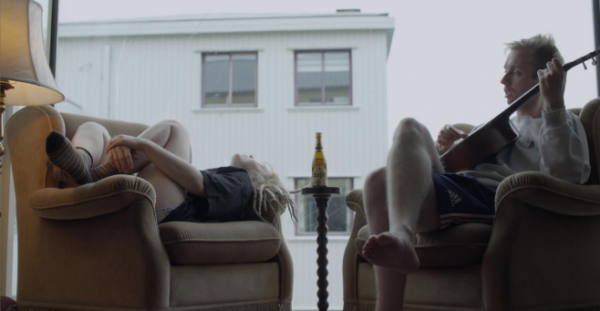
Embracing beliefs that enable us to give ourselves permission to broaden our horizons generally makes it possible to vanquish restrictions and limitations, obstacles that can hinder our creative freedom, prevent the emergence of our authentic selves, and curtail our capabilities for achieving satisfaction and fulfillment. That’s a lot to lose, but, if we don’t stalwartly step forward and claim such personal sovereignty for ourselves, that’s what is very likely to happen.
Consider some of the ramifications. In both a general and specific sense, it can stifle our creativity. This is true in a range of areas, from creating tangible works of art to developing inventive problem-solving skills to envisioning the manifestation of conceptions never before dreamed of. Think of where we might be without those skills at our disposal.
On a personal level, the lack of these conditions in our lives can do much to take most of the enjoyment out of life. Areas like romance, freedom of expression and the ability to pursue chosen lifestyles can all be hampered when we’re reined in (or allow ourselves to be). Where’s the fun in that?
Then there are life’s bigger questions. Without the ability to exercise our ambitions, we can severely limit ourselves when it comes to matters that are bigger than us as individuals. Examples include tolerance, evolution, innovation, integrity, and personal and social growth and development. Where would we be individually and collectively without those influences in our lives? Indeed, without them, we have a sure-fire recipe for stagnation on our hands, and where would that leave us?
In light of that, we could learn much from what Dania, Trygvi and Marjun are attempting to do. There’s much on the line, so much so that the implications may even be bigger than what they can fully appreciate. But what’s important is that they’re doing it. Cheers to them – and to their success.
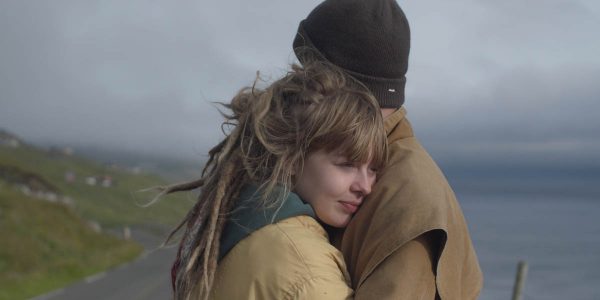
Though billed as a documentary, this captivating release plays more like a docu-drama or even a big screen version of reality TV. The film’s philosophical, romantic, artistic and coming of age elements are skillfully interwoven, creating a beautiful tapestry featuring an array of gorgeous colors and patterns, especially given the diverse backgrounds of its protagonists and the breathtaking backdrop for their story. Directors Cecilie Debell and Maria Tórgarð present an honest love story with deep spiritual and thought-provoking undercurrents, narrative elements often lacking in similar offerings. The film’s truly stunning cinematography is a sight to behold, showing off the seldom-seen beauty of the Faroe Islands. And, when combined with the picture’s heartfelt, intimate depictions of personal moments, the filmmakers serve up an unusual cinematic blend rarely featured in many movies, let alone those in the documentary genre. My only problem with this release is that so many of the most significant moments seem so perfectly captured that it almost makes me wonder about the validity of their authenticity, that they play more like scripted material than spontaneously caught events. That aside, though, this thoughtful, insightful release provides viewers with much to ponder, backed by gorgeous images and genuine warmth, quite an irony for a story set in such an otherwise-chilly locale.
Unfortunately, at this time, it may take some effort to find “Skál,” as it’s primarily been playing the film festival circuit. Nevertheless, it’s an offering worth seeing, one that earned it the Chicago Film Festival’s Gold Hugo Award as the top selection in the event’s International Documentary Competition.
Personal freedom is a virtue we must never take for granted. It’s something we must commit to preserving and be willing to fight for when others try to restrict our access to it. That becomes especially apparent when we consider the many roles it plays in our lives. Indeed, we run the risk of a seriously diminished existence if we fail at this task – and that would take away a lot of what makes life worth living.
Copyright © 2021-2022, by Brent Marchant. All rights reserved.

No comments:
Post a Comment